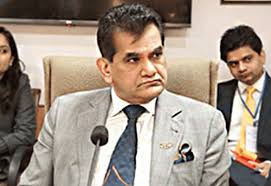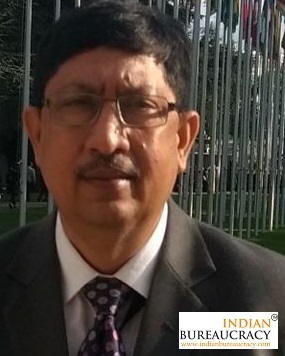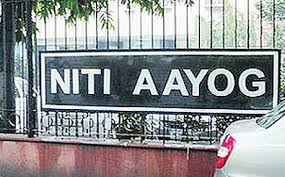
Mr. Amitabh Kant, CEO, NITI Aayog, today underscored the critical role of Indian industry in job creation and skilling as was the norm worldwide where skilling and job creation are led by the private sector. Mr. Kant was speaking as the chair of the session on ‘Future Skills: Technology, Jobs and Talent’ at the ninth edition of annual flagship skills conference, Global Skills Summit (GSS) organized by FICCI in association with the Ministry of Skill Development and Entrepreneurship, where the keynote address was given by Mr. Sharad Sharma, CoFounder, Ispirt Foundation. The panelists were Mr. Jeffry Jacob – Principal at Roland Berger India; Mr. Amit Jain, President – India, Uber Technologies; Mr. Bijay Sahoo, Co-Chair FICCI Skills Development Committee and PresidentHR, Reliance Group; Mr. Venkatesh Valluri, Chairman & Managing Director, Valluri Technology Accelerators/ Valluri Change Foundation; Mr. L R Sridhar, Co-Founder, CEO & MD, Connect India E-commerce Services Pvt Ltd and Mr. Arunkumar Pillai, Executive Director, EY India.
Mr. Sharma said that Industry 4.0, the next phase in digitization in the manufacturing sector driven by technological disruptions will negatively impact the job market with many jobs as we know them will disappear. Only three sets of jobs will survive in the 4th industrial revolution – ‘whole mind’ jobs such as product innovators and civil architects; sub-robo semi-skilled ones which pay less than $4 per hour and jobs such as those generated by barista coffee and nursing.
Mr. Sharma said that with the emergence of the dark side of the job market scenario, it would be difficult to imagine a future where full employment as an economic concept will remain valid. In fact, it will disappear. However, the bright side is that the cost of living is poised to plummet in the next 20 years, he said and added that in the future, transportation will undergo a sea change – pooling and cars as service will emerge; farmer productivity will rise as soil cards kick in; in healthcare there will be ubiquitous access to diagnostics, doctors and wellness; renewable energy will attain primacy; education will be in the Cloud space and entertainment consumption will be user generated like YouTube. The digital revolution will give rise to new public issues as politics, governance and civil society institutions will change, he said. Relationship between the citizen and the State will change due to the demands for privacy, security, and the rise of digital monopolies, Mr. Sharma said. At the same time judiciary and crime fighting will be revamped and income inequality will be in the forefront and economic mobility will be the new mantra.
Mr. Sharma said that the question today was can we prepare our children to be innovators in the new world. This is the meta challenge he said and asserted that today is the time for a new national bet – “We will embrace the idea of technological democratization.” In the session on ‘Skills for Migration: Mobility’, Ms. Panudda Boonpala, Director General – India, ILO, said that to become competitive in the world labor market, India needed access to real time information about the job markets across the world. This would allow India to understand the skills that are in demand and grab the opportunities. She added that the private sector needed to step up its efforts to converge the demands of the industry with the skills to be imparted to workers. Ms. Boonpala said that ILO advocated stronger governance of labor markets so as to facilitate migration of workers and create an ecosystem which is a win-win situation for the country of origin and country of destination and also for workers and enterprises. She added that upscaling skills of workforce would augment job opportunities for them and also give them the power to negotiate for better wages and better working conditions.
Migration of workers also take place for earning higher wages, said Ms. Boonpala and added that skilling would enhance the earning of workers and allow their countries of origin to have higher remittances. She added, India needed to expand its system of certification of skills particularly in the non-formal sector. Also, there was a need to invest in training of soft skills and multiskilling of workers. The session deliberated on the ways to speed up skill development transition through active industry engagement to achieve the aspirations of the society. The session was moderated by Mr. Sushil Ramola, Co-Founder & Chairman, B-ABLE. The panelists were Mr. Manish Gupta, Joint Secretary – Overseas Indian Affairs, Ministry of External Affairs, Government of India; Mr. Vasudeva M. Nayak, Former Senior Vice President and Group Head- Mobility & Assurance – Infosys; Dr Meera Sethi, Special Envoy to India, International Organization for Migration and Mr. Aishwarya Verma, National Head, Skills, Amity University.







Leave a Reply
You must be logged in to post a comment.